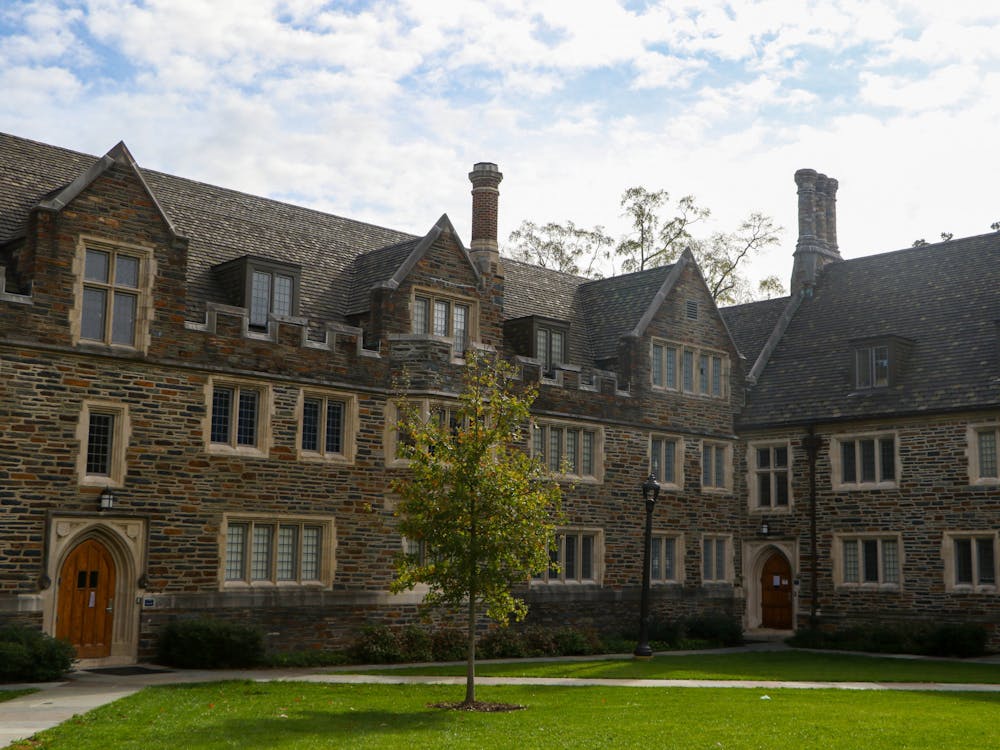Duke community members met with representatives of the Advisory Committee on Investment Responsibility and the Duke Management Company in their Fall Open Forum last month to discuss the future of Duke’s investments.
Questions during the Nov. 7 forum focused on the University’s continued investments in fossil fuels and community propositions for divestment.
Gina-Gail Fletcher, professor of law and chair of the ACIR, led the forum. She began by providing a brief background of the committee, which was formed in 2004 as an advisory committee that reports directly to the President of the University. Robert McGrail, head of legal and compliance at DUMAC, provided an update from DUMAC, the organization that manages Duke University’s endowment assets. Fletcher then addressed questions that were submitted ahead of time.
The ACIR is not directly responsible for investments, as DUMAC is the body responsible for managing the University endowment, according to Fletcher.
Instead, the ACIR’s primary roles include serving as a forum for the Duke community to bring forward concerns related to investment of the University’s assets, to allow Duke community discussions about issues brought to the committee, and to act as an advisor to the executive vice president on proxy votes on direct investments held by DUMAC.
Students have been advocating for Duke to divest from fossil fuels, both recently and in past years. The ACIR had decided to recommend against the divestment of fossil fuels in both 2019 and 2014, Fletcher said.
“We're still a very fossil fuel dependent institution. And so divestment would be symbolic,” Fletcher said. “It wouldn't have the type of wide scale impact that I believe that we all hope it would.”
Duke Climate Coalition, a student-led environmental advocacy group, estimates that 1-2% of Duke’s endowment is invested in fossil fuels, equating to about $127-254 million in assets.
“The sale of shares held by Duke would not have sufficient volume to affect stock prices, and the shares would actually quickly be bought by other investors in the market,” Fletcher said. “Strict prohibitions on certain investments … would interfere with fund manager relationships.”
The ACIR has proposed ways to reduce greenhouse gas emissions that it finds more effective to President Vincent Price, Fletcher said.
In response to ACIR recommendations, Price and the Board of Trustees have created a statement for DUMAC to consider Duke’s environmentally sustainable agenda, provided the Duke Impact Investment Group with $100,000 to be used in green entrepreneurship, and as of June 30, has no direct investments in any company under the Carbon Underground 200, a listing of the top 100 coal and top 100 gas companies globally.
“The difference between direct investment and indirect investment comes down to control,” said Robert McGrail, head of legal and compliance at DUMAC.
DUMAC holds the power to buy and sell direct investments while external investment managers are hired for indirect investments. DUMAC cannot control what the managers choose to buy and sell.
Duke’s fossil fuel investment policy was also compared to those of peer institutions such as Princeton and Harvard Universities.
Fletcher said that Duke's commitments are “actually very similar to those made by our peer institutions.”
She asserted that, despite Harvard’s claims, it has not divested and has modeled its investment statement after Duke’s own.
Princeton has a much more “robust” statement in that they plan to divest both from direct and indirect investments, Fletcher said. However, she said that Princeton is an “outlier” and that most University policies are similar to Harvard’s and Duke’s.
Get The Chronicle straight to your inbox
Sign up for our weekly newsletter. Cancel at any time.

